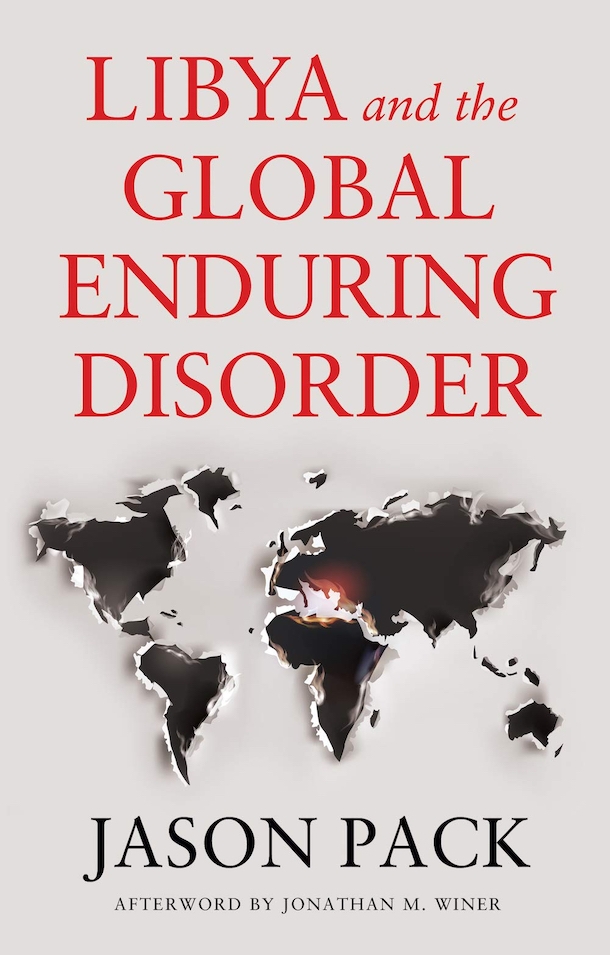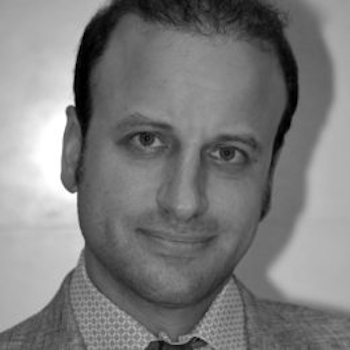
Books
‘Regimes are temporary but the semi-sovereigns’ power is forever’
Jason Pack’s timely new book Libya and the Global Enduring Disorder (Oxford University Press, February 2022) sketches the myriad sinews of connections linking Libya, Ukraine, Syria, and Egypt with the major hubs of the global economy. He contends that hot spots like Ukraine and Libya showcase certain fundamental truths about how the specific dysfunctionalities of the neo-liberal globalization of post-Statist economies have generated novel forms of corruption, oligarchy, and kleptocracy — affecting geopolitics everywhere.
Drawing on multidisciplinary source material in Arabic, Russian, and English, Pack demonstrates that dysfunction in key economic and strategic nodes like post-Soviet Ukraine and post-Qaddafi Libya had led to the rise of neo-populist leaders in the West. His book examines Libya and other hotspots as microcosms to glean the fundamental principles of our new post-post Cold War era.
For International Policy Digest, he presents the below portion of his book focused on the Ukrainian economy which comes from Chapter 4, “Libya Versus the Global Economy” pp. 239-245. It delves into the idea that post-Soviet Russia and Ukraine are inherently linked with post-Qaddafi Libya as examples of societies that had bracing political upheavals without any genuine economic reform, and hence the ensuing crony privatization did not alter the Statist economic systems and as such has produced the kind of political outcomes which characterize all three states. This excerpt begins by examining why those regime changes in 1991 and 2011 did not lead to fundamental economic reform.
***
This dovetails with developments in other post-Soviet and statist economies. As corrupt statist oligarchic systems break down, history has shown that their economic structures will not be comprehensively replaced. This tends to leave the most powerful individuals as those with insider access to semi-sovereign economic institutions rather than those with most entrepreneurial abilities.
In Libya, Russia, Egypt, and Ukraine during the Enduring Disorder, semi-sovereign institutions are where much real power has been vested—no matter how many changes of regime appear to take place. In Ukraine, in particular, post-Soviet semi-sovereign institutions dictate the nature of political competition, as the lucrative opportunities for illicit enrichment they generate can be monopolized by the family members and loyalists of the current ruler—just as access to semi-sovereigns can in Libya. This trend was particularly pronounced during the tenure of Viktor Yanukovych.
The types of illicit gains and the economic structures involved in Ukraine are eerily similar to those in Libya. Natural gas, for example, arrives in Ukraine from Russia and is sold internally and externally at non-market prices, just like refined petroleum products are in Libya. Ukraine traditionally overpays Gazprom for its gas. And Russia uses those profits to support its favoured politicians in Ukraine in order to sustain the system. Separately, subsidized gas is monopolized by semi-sovereign institutions like Naftogaz or RosUkrEnergo. Frequently, it is then illegally sold or smuggled at a price closer to the higher global market price (this step is done by the militias in Libya).
Ukraine spends roughly 7.5 percent of its budget on energy subsidies, and various preferred entities are able to use their preferential access to subsidized products to make staggering amounts of money. If Libya was not a crude producer and had to purchase all its crude for domestic refining and import all the extra refined product needed for domestic usage and then subsidize it, such subsidies would account for 7 to 10 percent of the typical Libyan budget. In both cases, a large part of these inefficient government subsidies simply goes into the hands of oligarchs, criminal gangs, and militias.
Another source of Ukrainian corruption comes from procurement fraud, whereby semi-sovereign entities issue non-transparent tenders for projects like airports, roads, and stadiums. They are then awarded to overpriced bids that have been placed by incumbent powerholders and oligarchs who use shell companies to pocket the difference between the services rendered and the fees charged. This is not wholly dissimilar to how ODAC procurement corruption operates.
One result of the kinds of economic structures Libya and Ukraine possess is a fierce and sometimes violent competition among elites to maintain their control of the money-generating semi-sovereign institutions. The other is protracted low-level wars fuelled by cycles of hot money emanating from the semi-sovereigns. These conflicts also engender tacit alliances of status quo players from both sides who benefit from the conflicts’ continuation as they impede fundamental economic reforms. Another result is that institutional elites from former regimes are difficult to fully depose and usually retain the ability to make a comeback due to their embedded networks at the unelected semi-sovereigns.

Even Ukrainian President Volodymyr Zelensky, who ran for election in 2019 on an anti-corruption and anti-oligarch ticket, has been unable to quash accusations of being beholden to Ihor Kolomoisky, one of Ukraine’s most powerful billionaires. Kolomoisky’s wealth derives from his oil and media empire and his role in co-founding one of Ukraine’s first private commercial banks, ingeniously named PrivatBank. He is currently under investigation in the United States for embezzlement and fraud of funds from Ukraine’s para-statal institutions by PrivatBank. U.S. courts are able to have jurisdiction due to Kolomoisky’s surprising decision to acquire commercial real estate in Cleveland, Ohio of all places.
The Ukrainian story is therefore not so dissimilar to events in Libya, where after ten years of chaos without a firmly established political sovereign, the first non-military personality to properly wield patronage networks to create genuine governance happens to be Abdul Hamid Dabaiba. He is also the first post-Qaddafi prime minister to have inherited the legacy networks of one of the Qaddafi regime’s most powerful institutions, ODAC.
This process is also similar to how the Egyptian Army and connected security apparatuses were briefly deposed from power but then returned with a vengeance. The Army has been the real power behind the throne since Gamal Abdul Nasser’s death. Its control over the Egyptian economy had become so vast that it came to function like a semi-sovereign institution. Its decision to switch its support to the protesters in the early days of February 2011 brought about President Hosni Mubarak’s downfall. A year later, the Army was briefly dislodged from power when its preferred candidate lost the June 2012 elections and Mohammed Morsi, the Muslim Brotherhood-aligned candidate, won the popular vote.
However, after less than thirteen months, Morsi was deposed in what amounted to a bloodless coup. He had proven unable to progress on his political agenda due to an inability to control the Army’s power centres in the economy and ministries. Now, nearly eight years later, it is widely accepted that the ‘new’ Egyptian regime under Abdel Fattah el-Sisi is not so different from the old regime under Mubarak, as it derives its power base from the most powerful institutional networks of the old regime—the Army and the intelligence services. In the words of Egyptian political commentator and activist Sawsan Ghareeb: “Sisi’s power base is the deep state. Both are simply an extension of Mubarak’s regime. Sisi’s regime derived its strength and survival from the deep state and the Mubarak network [otherwise Sisi would not have been able to retain power and Egypt would be ungovernable].”
Tangential benefits
It would be incorrect to say that Qaddafi ingeniously created ODAC and its sister organizations to ‘hack global capitalism’ or to create an institutional powerhouse that would keep his allies in control of Libya after his demise. He created it and similar entities to help him govern Libya as well as to enrich his cronies and pilfer Libyan state coffers. Yet to achieve those aims, these organizations needed to employ special legal structures and have corporate veils constructed around them. It just so happened that once these structures were in place, they provided the tangential benefit of being ideal vehicles to pervert the tendering, invoicing, and legal conventions on which interstate commerce rests.
Similarly, post-Soviet Russia’s most powerful leader, Vladimir Putin, emerged from one of the Soviet Union’s most powerful institutions: its intelligence services. Yet the Soviets did not create its intelligence services to hack Western elections or manipulate news coverage. Both the Soviets and Qaddafi created their signature semi-sovereign institutions to help them stay in power. Although they failed to achieve that function, their truly unique capabilities came to light later.
This is just like with drug development. Frequently, a new molecule is initially identified as a promising therapy for a given condition, but then fails in the clinical trial to show sufficient results. Yet having been created, catalogued, and stored, its truly ‘killer app’ is discovered at a later moment by another research team.
Why has global capitalism been so susceptible?
It is gradually becoming apparent that the West’s centuries-old democratic institutions are less robust than had once been assumed. The same is true with our supposedly free markets. Markets rely on trust. No law and enforcement system can ever detect all the malevolent actors at play in the market, especially if certain legal structures like subsidies reward those who game the system.
To the extent that they ever functioned properly, free markets and open democratic electoral systems were always incredibly fragile as they rest upon various contradictions remaining submerged, most participants agreeing to play by the rules of the game, and most malcontents being unable to cause a raucous. Slightly more animosity, slightly less trust, and slightly more fake news always had the potential to tip the scales towards total system meltdown. Given the inherent fragility of democratic socio-political harmony, it is not surprising that neo-populist contagion emerging naturally and introduced by social media from Russia was able to exacerbate previously submerged cultural conflicts in Western political institutions.
Equally important to the political story is the economic one. Authoritarian and post-socialist economies inadvertently devised genius vehicles for injecting similarly damaging contagion into global capitalism. In the case of Libya, this was done by the seemingly simple ploy of issuing lucrative contracts through vehicles that appear to be Libyan state entities but then cannot be proven in international courts to constitute parts of the Libyan state. This allows those entities to be able to break contracts with limited international legal liability. …..
Excerpted from Libya and the Global Enduring Disorder by Jason Pack. Copyright © 2022 by Jason Pack. Excerpted with permission by Oxford University Press.
